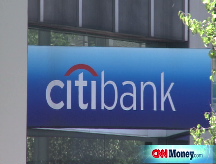RBS posts Britain's biggest-ever loss
Bank company unveils restructuring plan that will limit global operations.
LONDON (CNN) -- Part-nationalized British banking group RBS announced massive losses for 2008, totaling $34.6 billion Thursday. The results are the worst in British corporate history.
RBS's loss exceeded the previous record set by Vodafone in 2006 by more than $14.3 million.
"Last year was undeniably tough and a worsening economic environment means that 2009 will present significant challenges in all of our markets," said Philip Hampton, RBS chairman. "The path to recovery will be neither smooth nor straight."
The results were not quite as bad as had been expected, said CNN business anchor Charles Hodson, and they caused RBS shares (RBS) to rise 22% in early Thursday trading.
"This is a watershed," Hodson said. "RBS hopes this is a positive turning point ... that now this is where the recovery begins, with the old regime being laid to rest."
Hodson added, "RBS will hope this is as bad as it gets. But there's a body of thought that says it's badly positioned."
The 2008 financial report from RBS includes a three- to five-year restructuring plan that will focus the group's business in the United Kingdom, with more limited global operations. The plan includes changes in management, isolation of toxic assets, and selling or closing "non-core" businesses.
Last October, RBS was one of three major banks the British Treasury pumped $63 billion into to keep liquid. The other two financial institutions were HBOS and Lloyds TSB.
The bailout saw the government take a 70% stake in RBS, making the government the bank's largest shareholder and effectively nationalizing the company.
"We have moved purposefully to take major decisions that are necessary to restructure the group," said Stephen Hester, RBS group chief executive. "We are charting a path to standalone strength and with it the goal of justifying the support of the U.K. government and all our shareholders."
In January, the government announced the Asset Protection Scheme - an effort to help British banks caught up in the global financial crisis. The Treasury revealed details of the plan Thursday.
The plan has a number of facets benefiting the bank and the government.
Under the plan, the British government will insure $466 billion in RBS assets. RBS must pay a "participation fee" of $9.3 billion to the Treasury and bear $28 billion of any loss - a sort of deductible.
In addition, RBS will promise to lend $36 billion this year - $13 billion for mortgage lending and $23 billion to businesses. That commitment is key for the government, which has been urging banks to increase lending.
The government will also inject an extra $18.6 billion in capital - a move that will raise the government's stake in RBS to 80%.
RBS must now start restructuring and cutting costs, and layoffs are likely.
"We're going to see a much slimmer bank, a much smaller balance sheet, several billion dollars' worth of costs taken out, and hopefully that will guarantee them a future," Hodson said.
The Royal Bank of Scotland is one of Britain's oldest banks. It was founded in Edinburgh, Scotland, in 1727 and branched out to England in 1874.
After winning a takeover battle for British bank NatWest in 2000, RBS set its sights on Dutch bank ABN-AMRO. Two years ago, RBS bought ABN-AMRO as part of a consortium with Santander and Fortis, paying $15 billion for its share out of a total of $75 billion.
ABN-AMRO was the source of big write-downs for RBS, leading to the government bailout in October.
Former RBS Chairman Tom McKillop recently admitted publicly that buying ABN-AMRO was a bad mistake.
Earlier this month, former RBS Chief Executive Fred Goodwin told members of the British Parliament that he was sorry for the bank's part in the global financial crisis.
"There is a profound, unqualified apology for all of the stress that has been caused," Goodwin said. But he said the troubles at the bank were not all due to him.
"It's just too simple if you want to blame it all on me," Goodwin said. "If you want to blame it all on me and close the book now, that'll get the job done very quickly, but it does not go anywhere close to the cause of all of this."
Goodwin, 50, faced scrutiny Thursday over his annual pension of $933,000 following RBS's announcement.
British Chancellor of the Exchequer Alistair Darling urged Goodwin to give up his pension, telling the BBC that "these excesses" cannot be justified.
Current RBS Chairman Philip Hampton also voiced concern about the amount and said RBS is consulting with legal advisers about whether the pension can be reviewed. Hampton told reporters he had asked Goodwin to take a voluntary reduction in payments, and Goodwin had said he would think about it. ![]()


